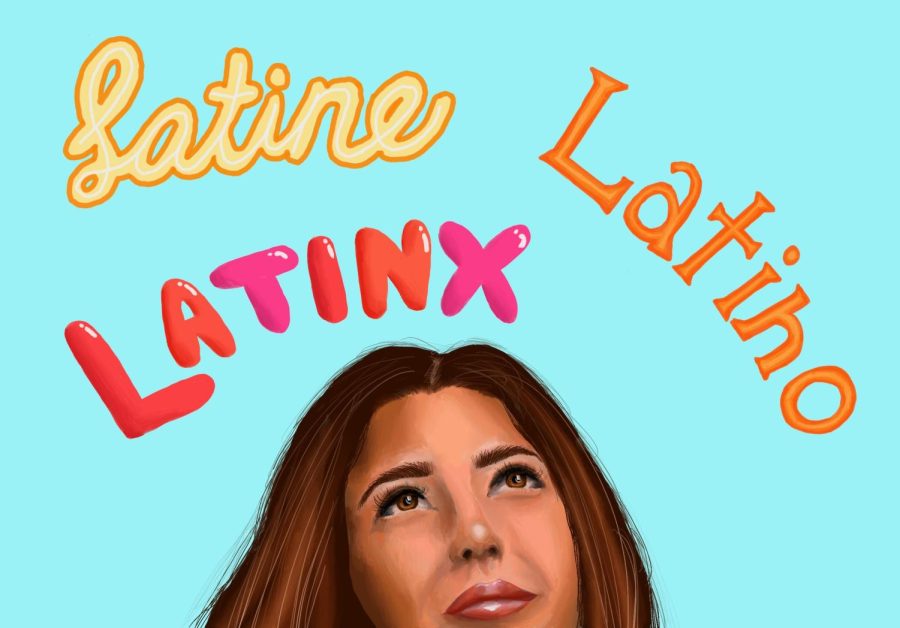Debate Surrounds Latino/Latinx/Latine Ethnicity Terms
Debate surrounds terms such Latinx
Throughout this past year, topics revolving around race and ethnicity have made it to more of the forefront of our conversations at school, at home and just in general.
Due to these conversations, I have spent more time thinking about how I want to label my own racial and ethnic identity.
My mom’s side of the family stems from South America, more specifically Colombia, and historically there are 2 main terms that people with Latin American Spanish-speaking heritage have used to describe their ethnic identity: hispanic and latino/latina. I didn’t really know the difference between the 2 terms, or that there were more terms out there, until recently.
While I have spent more time thinking about my own identity and how to label it, there is a more broad ongoing conversation happening amongst the community that originates from Latin America (and Spain), surrounding what ethnicity label should overall be used. Before diving into the heavily discussed conversation surrounding the different terms, I think that it is important to know where the different terms originated from, why they were created, and what they mean.
To clarify, the terms that are going to be discussed are not words to describe race, but ethnicity. Race and ethnicity are often used interchangeably, however they are actually 2 different terms entirely. Race usually refers to physical characteristics, however ethnicity is associated with cultural identity and where a person originates from.
In the early to mid 1800s, the US government annexed Florida, Louisiana, and the northern half of what was then Mexico, making more than 100 thousand Spanish speaking people US residents. Due to the Treaty of Guadalupe Hidalgo of 1848, more states with Latin American people, like California, were annexed. For as long as there have been Latin American people present in the United States, there have been words to describe them, most of the words being incredibly offensive; however it wasn’t until the 1980’s, where there was an official separate term, “Hispanic,” added to the United States census.
The ethnicity term “Hispanic” refers to the group of people who are from Spain or other Spanish speaking countries, excluding Brazilians. It stems from the term “hispano,” however it turned into hispanic in order for the term to be more palatable for English speakers and for it to seem more “American.”
This term was a result of lobbying from UnidosUS (formally called National Council of La Raza) which happened during the 1960’s and 1970’s. Before hispanic was added to the census, allowing for there to be a government distinction between Anglo-Saxon white people and Latin American and Spanish people.
The ethnicity term did not become mainstream until the 1990’s, when there was another round of the census, as well as more exposure about the term from Latin American media.
Not every Latin American person liked the term hispanic, however. Since Latin American people are from so many different countries and places of origin, many felt like the term was too constricting, putting too broad of a box on a large group of different types of people. Others felt like the term was too “Spain centric.”
By 2000, the term Latino/Latina was put onto the US census next to the term hispanic. It is a term to describe the group of people who originate from Latin American countries, including Mexico, Central America, and all of South America, but excluding Spain.
“Many current latinos tend to stray from the term hispanic… because it really centers Spain… and if you are from the Americas… if you are indigenous… We try and distance ourselves from hispanic because it really echoes colonialism and eurocentrism… which is something we have tried to avoid due to the erasure of indigenous communities,” said Spanish and French teacher Leticia Del Toro-Gasquy.
Spanish and most other romantic Latin-based languages, like French and Italian, are binary, meaning that all words are either male or female. For example, the term “Latino” is masculine and “Latina” is feminine.
However, when it comes to people’s gender identity, the scale is not binary. The term Latinx replaces the masculine or feminine vowel at the end of Latino/Latina and replaces it with an x, making the term gender neutral.
“I first started hearing Latinx about 6 or 7 years ago, and I was mostly hearing about it from college communities and current college students and current academic professors and people in the publishing world, specifically from Latinx authors… It seemed to be [popular] because it was taking away the gender emphasis,” said Del Toro-Gasquy.
The term has received negative opinions however, sparking a bit of a debate surrounding the term. Many claim that the term is too confusing, or even created by non-Latin American white people.
“White people did not make up Latinx… It was queer Latinx people… They are the ones who used the word. Our little subgroup of the community created that. It was created by English-speaking U.S. Latinx people for use in English conversation,” said David Bowles, a Mexican American author and professor at the University of Texas Rio Grande Valley in an interview with the History channel.
In recent years, I have heard the term Latinx being pretty prevalent on social media, but also in politics. Back in June of 2021, even President Joe Biden used the term Latinx to describe Latin American communities.
However, it is still heavily criticized by many.
“I prefer the term Latino or Latina… I think that Spanish is a gendered language and I think that it is pretty intrinsic… and I don’t really like efforts to change that… I don’t like the term Latinx… I think that it is disrespectful to the language itself,” said junior Justin Rodriguez, who identifies as Latino.
While I think that the term has great intentions and works well when speaking the English language, it doesn’t flow that well in Spanish.
There is a solution to this though: the term Latine. Adding the vowel e to the end, allows for the term to remain gender neutral, while flowing better in the Spanish language.
“Latine is a more organic evolution in making a gender neutral descriptor… Because people do not know what to do with the x at the end of Latinx… it has sparked a lot of confusion around it,” said Del Toro.
“I’d currently be more open to the term Latine.. Since I just think Latinx does a disservice to the Spanish language in general,” said Rodriguez.
Junior Diego Davila Gil, who self identifies as Latine, added, “Personally I am for Latine only because it is more related to the Spanish language than Latinx… because there is not a really easy way to say [Latinx] in Spanish… it doesn’t function well… And so I think if you want to make gender pronouns… they have to flow within the language.”
Davila Gil added, “In terms of the discourse that is happening… If you don’t want to use the language… no one is forcing you to… and if you insist on not using [Latine], that tells gender neutral hispanic people to not be around you.”
Ultimately, I think that it should be up to each individual to decide what word they should use to identify themselves.
Ethnicity labels are not concrete, but ambiguous terms to try and group and categorize people. People originating from Spain, Central America, South America, Mexico, Cuba, are diverse groups of people with different ideologies and belief systems.
When referring to yourself, the term should always be what you feel most comfortable with, and what describes you and your experiences the best. However, I think when referring to a group of people I would use Latine. It is the most gender inclusive while remaining respectful to the ways in which the Spanish language works.
“I think that everyone should use the word that they are most comfortable with… I personally would say I am Latina. In a group setting Latine is more inclusive, and that is what I use [when] talking to a group of Latines,” said junior Campolindo Latinos Unidos president, Marissa Castillo.
Your donation will support the student journalists of Campolindo High School's The Claw. Your contribution will allow us to produce more issues and cover our annual website hosting costs.

Senior Isabelle Katz loves to learn and tell stories. Depth reporting is a passion of hers. “You have to execute the craft of story telling and let the...

Alex Gonzales is a senior and a 1st year journalism student on the Art Staff. Gonzales grew up in Montclair before moving to Lafayette. “I joined journalism...






